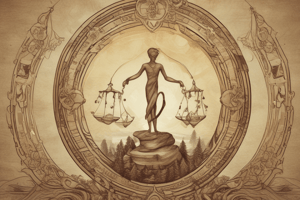Podcast
Questions and Answers
Which influential work by Jean-Jacques Rousseau introduced the concept of the 'general will'?
Which influential work by Jean-Jacques Rousseau introduced the concept of the 'general will'?
- The Social Contract (correct)
- Discourse on the Origin and Basis of Inequality Among Men
- Julie, or the New Heloise
- Emile, or On Education
Rousseau published 'The Social Contract' in 1755.
Rousseau published 'The Social Contract' in 1755.
False (B)
What is the title of Rousseau's literary masterpiece published in 1761 that emphasized sentiment over reason?
What is the title of Rousseau's literary masterpiece published in 1761 that emphasized sentiment over reason?
Julie, or the New Heloise
In 'Emile, or On Education,' Rousseau presented a treatise on __________ philosophy.
In 'Emile, or On Education,' Rousseau presented a treatise on __________ philosophy.
During the 19th century, what major shift occurred in Germany and Italy?
During the 19th century, what major shift occurred in Germany and Italy?
Hume's philosophy challenged the Cartesian notion of innate knowledge.
Hume's philosophy challenged the Cartesian notion of innate knowledge.
According to David Hume, what is the basis for ethical conduct?
According to David Hume, what is the basis for ethical conduct?
According to David Hume, while some virtues may be inherent or natural, justice is considered an ______ virtue.
According to David Hume, while some virtues may be inherent or natural, justice is considered an ______ virtue.
Match the following concepts with their descriptions:
Match the following concepts with their descriptions:
What term is used to describe Hume's critique of deriving moral principles from empirical facts?
What term is used to describe Hume's critique of deriving moral principles from empirical facts?
According to Hume, what is imperceptible but of the last consequence in moral reasoning?
According to Hume, what is imperceptible but of the last consequence in moral reasoning?
Jeremy Bentham proposed that the morality of an action should be determined by its ability to maximize overall happiness.
Jeremy Bentham proposed that the morality of an action should be determined by its ability to maximize overall happiness.
Jeremy Bentham's philosophy emphasized the principle of utility as the sole moral guide for both __________ and private conduct.
Jeremy Bentham's philosophy emphasized the principle of utility as the sole moral guide for both __________ and private conduct.
Match the following legal concepts with the thinker associated with them:
Match the following legal concepts with the thinker associated with them:
Flashcards are hidden until you start studying
Study Notes
The Decline of Natural Law
- 19th century marked by significant geopolitical shifts and internal upheavals in Europe
- Congress of Vienna (1815) aimed to restore stability after French Revolution and Napoleon's military campaigns
- Internal unrest led to concessions, such as written constitutions and expanded suffrage
- Unity of Germany and Italy led to emergence of nation-states
- Shift from natural law and social contract towards legal positivism, especially in Germany
- Historical School viewed law as expression of people's consciousness and traditions, rejecting universalism of natural law
- Legal positivism separated law from morality, defining it as state-derived commands and norms
David Hume (1711-1776)
- Scottish philosopher who rejected innate ideas and argued that all human knowledge is derived from experience
- Major work: "Treatise on Human Nature"
- Challenged Cartesian notion of innate knowledge and emphasized role of sensory impressions in forming ideas
- Argued that causality cannot be proven through a priori reasoning, but is based on observed regularities in conjunction of events
- Contended that humans infer causality from repeated experiences of certain objects being consistently connected
David Hume's Critique of Natural Law
- Moral conduct is rooted in feelings rather than reason
- Moral rules cannot be derived from reason alone
- Challenges traditional theories of natural law, which emphasize role of reason in identifying moral principles
- Justice is not a natural virtue, but an artificial one, crafted by society to regulate human interactions
David Hume's Philosophy
- Three natural laws:
- Stability of possessions
- Transfer of property by consent
- Obligation to keep promises
- Justice has a conventional rather than natural origin
- Government is not universally essential, but is derivative from societal needs
- Critique of social contract theory, highlighting its impracticality and lack of tangible evidence
Jeremy Bentham (1748-1832)
- Pioneering figure in utilitarianism and legal positivism
- Developed principles of utility and "greatest happiness of the greatest number"
- Advocated for representative democracy, universal suffrage, women's rights, and abolition of slavery
- Supported codification of laws and opposed the death penalty
- Criticized common law and advocated for substantial reforms
Jeremy Bentham's Utilitarianism
- Psychological hedonism: human behavior stems from desire for pleasure and avoidance of pain
- Morality of an action is determined by its ability to maximize overall happiness
- Criticized for potentially neglecting interests of minorities
- Emphasized subsidiary political goals such as security, subsistence, abundance, and equality### Laws and Security
- Laws protect individuals' expectations of pleasure and prevent pain by ensuring that events governed by the law align with these expectations.
- Clear, coherent, and consistently applied laws are necessary for security.
- Bentham advocates for a literal interpretation of laws, even if they are obscure or inconsistent.
Promulgation of Laws
- Laws must be known to those they govern.
- Promulgation involves more than mere publication; it requires presenting laws to people's minds, ensuring they are remembered, and providing opportunities for consultation.
- Ideally, laws should be ingrained in the public consciousness, influencing moral conduct.
Natural Law and Positive Law
- Jeremy Bentham challenged prevailing concepts such as natural rights and the social contract.
- Bentham's rejection of natural rights stems from his utilitarian worldview, which holds that human behavior is governed by the pursuit of pleasure and the avoidance of pain.
- Rights derive from positive law enacted by public authorities and must be assessed based on their utility to society.
Critique of Natural Rights and Social Contract
- Bentham argued that the existence of absolute natural rights would lead to chaos and anarchy unless they were subject to the principle of utility.
- He criticized the notion of natural rights as "imaginary" and advocated for laws grounded in rational utility rather than abstract principles.
- Bentham dismissed the social contract theory as a fictitious and unnecessary concept.
Government and Accountability
- Bentham emphasized the importance of transparency and accountability in government.
- He advocated for mechanisms such as freedom of the press and public oversight to ensure that government actions align with the interests of the people.
Transition to Legal Positivism
- Rousseau and Kant contributed to the transition between natural law and legal positivism.
- Both emphasized the experience of the social contract, leading to a focus on empirical analysis in jurisprudence.
Jean-Jacques Rousseau
- Rousseau was a multifaceted figure of the Enlightenment era, contributing to philosophy, literature, and political theory.
- He published "Discourse on the Origin and Basis of Inequality Among Men" in 1755, critiquing societal structures.
- His novel "Julie, or the New Heloise" (1761) emphasized sentiment over reason, contributing to the Romantic movement.
- Rousseau's "Emile, or On Education" (1762) and "The Social Contract" (1762) introduced the concept of the "general will," influencing revolutionary thought and later political theory.
Studying That Suits You
Use AI to generate personalized quizzes and flashcards to suit your learning preferences.




